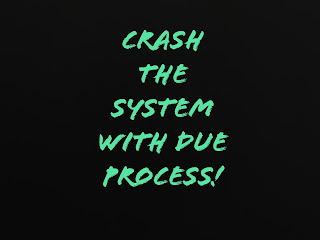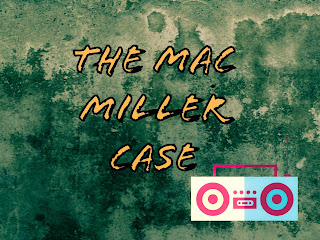Disrupting the Justice System: How Jury Trials Would Force Reform
A
Justice System Made for the Cops, Prosecutors, and Judges
Law enforcers have
established an assembly line justice system in the United States and, because
of this, the regulations in the Constitution have been disregarded for many years
now and turned into a weak formality that many professionals become groggy over
when it is applied (Alexander, 2012; Bohm, 2006; Dzur, 2011;
Wildeman & Wang, 2017). The
expectations of justice in this country, according to many police officers,
prosecutors, and judges, is that if a person is arrested and accused of a crime
that there is little recourse that should be pursued regarding due process provisions
and the defendant should succumb to the desires of quick justice by the legal
practitioners (Alexander, 2012; Bohm, 2006; Dzur, 2011; Wildeman & Wang,
2017). Mass incarceration is an example
of this, but there are also other instances that prove that our criminal
justice system is being operated on a fast-paced and smooth operating conveyer
belt ideology. That is, police officers
and prosecutors in the nation have turned the criminal justice system into an
award system for themselves with little or no regard for the laws and rights
that they are supposed to know and uphold (Alexander, 2012; Bohm, 2006; Dzur, 2011;
Wildeman & Wang, 2017). Further, judges
cater to these perverse understandings in order to maintain the current status
of the criminal justice system and to not cause problems with the government
attorneys or street-level law enforcers (Alexander, 2012; Bohm, 2006; Dzur, 2011;
Wildeman & Wang, 2017).
This acceptance by the
judges in the country is based on the acknowledgement of relying on
other practitioners to keep their positions and that if they actually presided
over cases in a fair and impartial manner, as well as in accordance to the other rules in the Constitution,
that other law enforcers have the ability to tarnish their reputations and possibly have them removed from the bench (Alexander, 2012; Bohm,
2006; Dzur, 2011; Wildeman & Wang, 2017).
Given these extraordinary mental states and legal processes, this essay
will discuss how significant reform in the criminal justice system falls into
the hands of criminal defendants and criminal defense attorneys and how causing
chaos in the courts may be the only possible remedy for the many years of botched justice in the United States.
Making
the Legal System Fair and Impartial Again
Once more, forcing prosecutors and
judges to participate in jury trials may be the only way to establish positive and long lasting augmentations in the criminal justice system.
The routine agenda of arresting people, sending them to court, detaining
them during pretrial, and attempting to seek a guilty plea quickly can actually
be turned against the practitioners in the criminal justice system if there was
a bond between criminal defendants and criminal defense lawyers (Alexander, M., 2012; Roberts, 2013, Stuntz, 1997).
Explaining more, because there are a large number of criminal defendants
dealing with accusations in criminal courts in the United States, the courts
would never be able to adequately process every case if all the defendants
invoked their rights to a trial by jury because of the lengthy pretrial motion
procedures and jury selection processes, and time it takes to
conduct a trial by jury.
The lower courts,
currently, do not have the resources to adequately manage the caseloads that
they deal with now, and if the processes were slowed down the courts, and its
ancillary components, would implode because of the massive workload and time
that it takes to process pretrial and trial procedures (Alexander, M., 2012; Roberts,
2013, Stuntz, 1997). In addition to
this, if the lower courts became flooded with requests for jury trials the
practitioners would not be able to resort to any other conjured assembly lines
processes because of the social turmoil that would manifest. That is, if the legal practitioners attempted
to resolve the overwhelming number of requests for jury trials many
organizations and civilians would erupt with rage and bring attention to this, and
also create more legal issues that would bring additional problems to the legal
practitioners. Thus, any quick-fix
solution that could be manifested by the courts and other legal entities would
be not only unconstitutional, but also counterproductive (Alexander, M., 2012; Roberts,
2013, Stuntz, 1997).
Use
Your Imagination and Make it Reality
Imagine what would happen
in our society if every accused criminal defendant opted to partake in a trial
by jury. Again, the criminal justice
system would implode and never be able to function properly (Alexander, M., 2012;
Roberts, 2013, Stuntz, 1997). There are
only a few hours in the day to process defendants in the courts, a certain
number of open beds in jails and prisons, and not enough community correction
personnel to handle an enormous caseload increase if community supervision were
to be used as a utility to deal with overcrowded correctional facilities. The lower courts would crumble, as well as
bombard appellate courts with cases and, in turn, cause serious disarray in the legal
system and in society (Alexander, M., 2012; Roberts, 2013, Stuntz, 1997). Police officers would be told to stop
arresting people, prosecutors would have to put a significant amount of attention
toward one case rather than having an easy workload of many cases, and judges
would never be able to render proper decisions given the significant increases in motions being sent to the courts (Alexander, M., 2012; Roberts, 2013, Stuntz,
1997).
Slowing down the criminal
justice system and forcing the practitioners to engage in jury trials would undoubtedly
force lawmakers and law enforcers to create reformations that are more humane,
less severe, and fair (Alexander, M., 2012; Roberts, 2013, Stuntz, 1997). Constitutional rights would be restored and
civilians would have their faith restored in the legal system. Is there anything negative about this? Arguments could be made that suggest that if
the criminal justice system became saturated with jury trials that some guilty
and dangerous offenders would be cut loose and continue with their
criminality. However, this is where due
process arguments can be applied and, in turn, infer that if courts are forced
to dispense proper justice then a better configuration of law enforcement would
ensue. That is, law enforcers would be
forced to learn and apply constitutional rights properly and make sure that the
possibility of having guilty offenders set free did not exist.
References
Alexander, M.
(2012, March 10). Go to
trial: Crash the justice system. The New
York Times.
Retrieved from https://www.nytimes.com/2012/03/11/opinion/sunday/go-to-trial-crash-
the-justice-system.html.
Alexander, M. (2012).
The new Jim Crow. Mass incarceration in the age of
colorblindness.
New
York, NY: The New Press.
Bohm, R. M.
(2006). “McJustice”: On the McDonaldization of criminal justice. Justice
Quarterly, 23(1),
127-146.
Dzur, A. W. (2011). “Why American democracy needs the jury trial”. Criminal
Law and
Philosophy, 5(1),
87-92.
Roberts, J.
(2013). Crashing the misdemeanor
system. Washington and Lee Law Review,
70(2), 1089-1131.
Stuntz, W. J. (1997). The uneasy relationship between criminal
procedure and criminal justice.
Yale Law Review, 107(1), 1-76.
Wildeman, C., & Wang, E. A. (2017).
Mass incarceration, public health, and widening
inequality in the USA. The
Lancet, 389(10077), 1464-1474.



Comments
Post a Comment